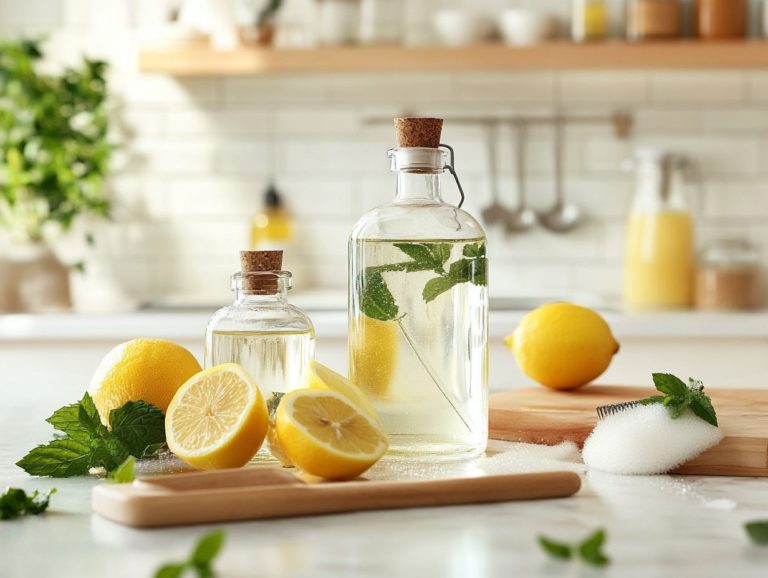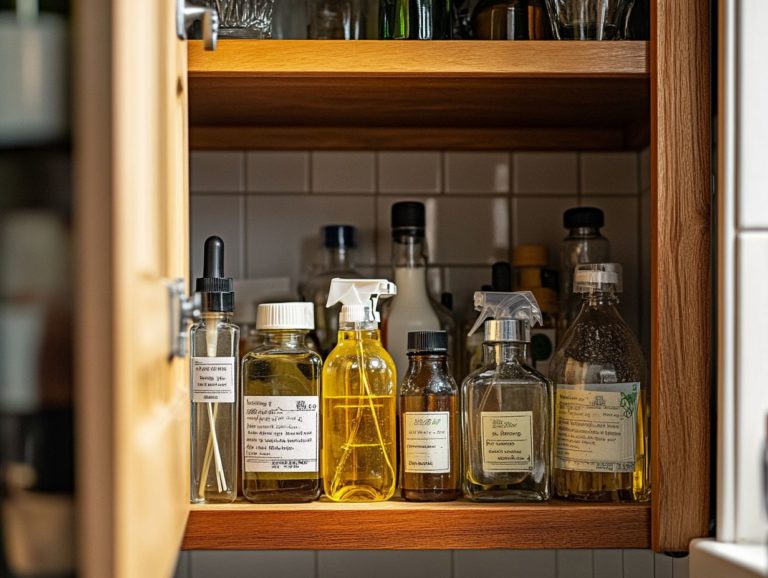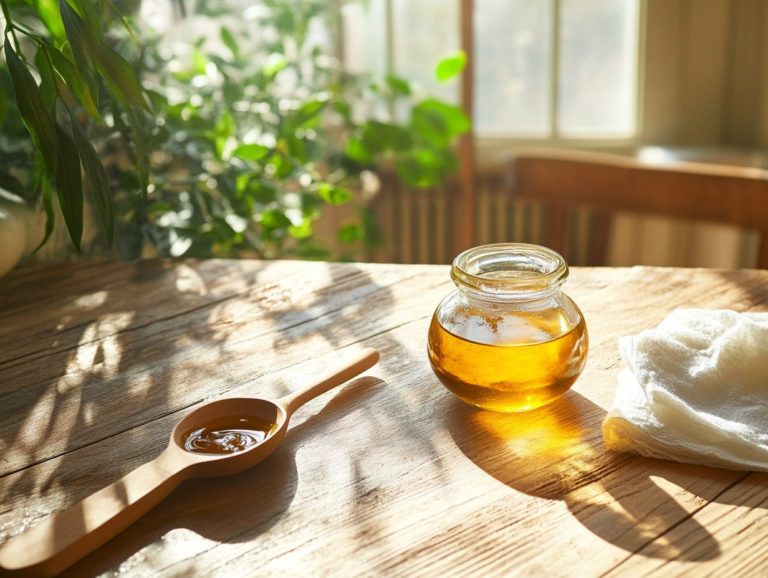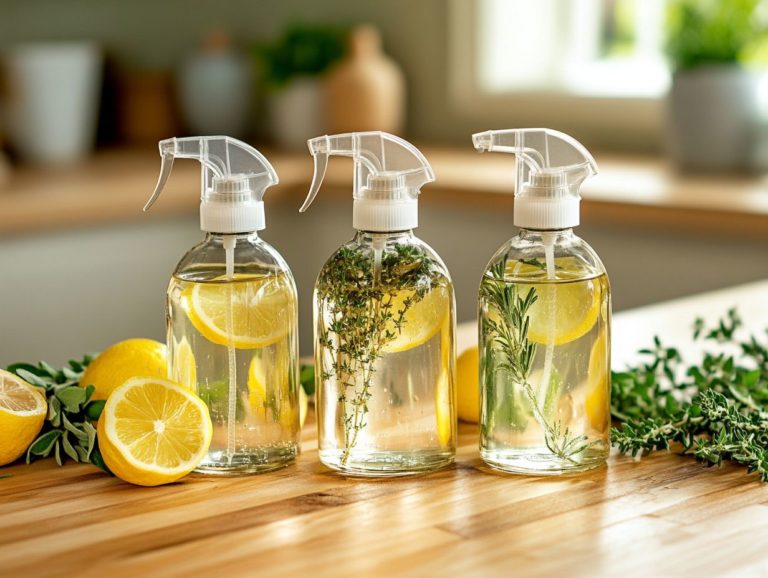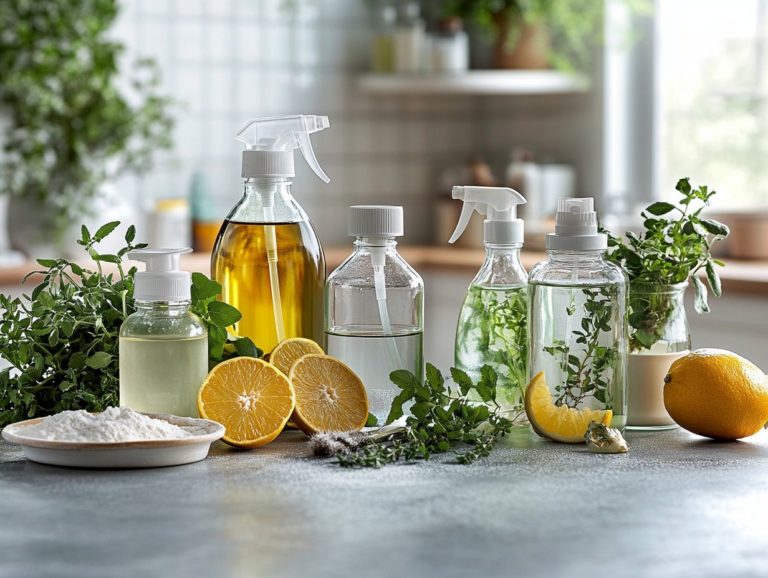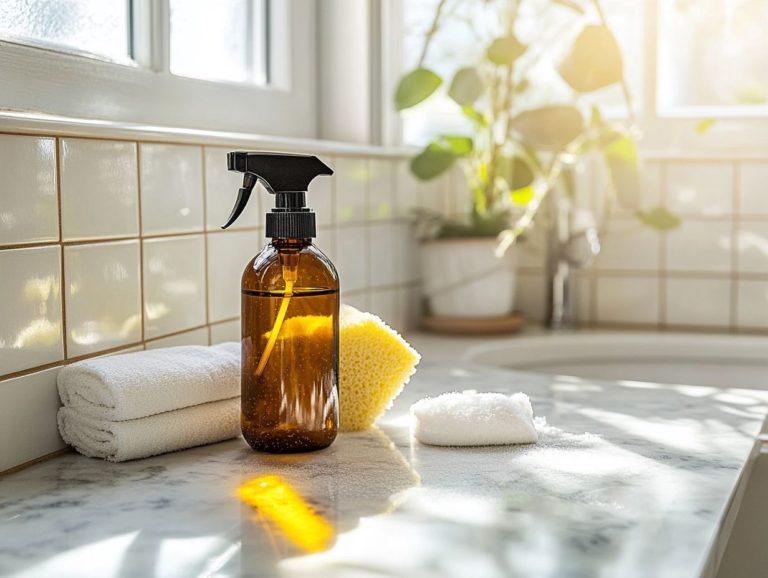Homemade Floor Cleaner Recipes for Every Type
Are you seeking a more eco-friendly and cost-effective method to keep your floors gleaming? A homemade floor cleaner could be exactly what you need.
This article delves into the advantages of creating your own cleaning solutions, showcasing a range of simple, natural ingredients that are effective and safe for your home. Plus, we ll discuss the environmental impact of DIY cleaning solutions and how they compare to commercial products.
Whether you have hardwood or vinyl floors, you’ll find tailored recipes designed for various floor types, making your cleaning routine as effortless as it is efficient.
You ll also find essential tips on safety and storage. These will help you maintain a clean and healthy living space that you can truly enjoy. You’ll discover the best cleaning tools to supercharge your routine!
Contents
- Key Takeaways
- Why Use Homemade Floor Cleaners?
- What Ingredients Can Be Used to Make Homemade Floor Cleaners?
- How to Make Homemade Floor Cleaners for Different Types of Floors?
- Are Homemade Floor Cleaners Safe to Use?
- What Are the Benefits of Using Homemade Floor Cleaners?
- What Are the Potential Risks of Using Homemade Floor Cleaners?
- How to Store Homemade Floor Cleaners?
- How Often Should You Use Homemade Floor Cleaners?
- Frequently Asked Questions
- Looking for simple recipes for cleaning your tile floors?
- Can I use a homemade cleaner on laminate floors?
- Will homemade floor cleaner damage hardwood floors?
- Can I add essential oils to my homemade floor cleaner?
- What is the best homemade floor cleaner for pet owners?
- Are there any homemade floor cleaner recipes for vinyl floors?
Key Takeaways
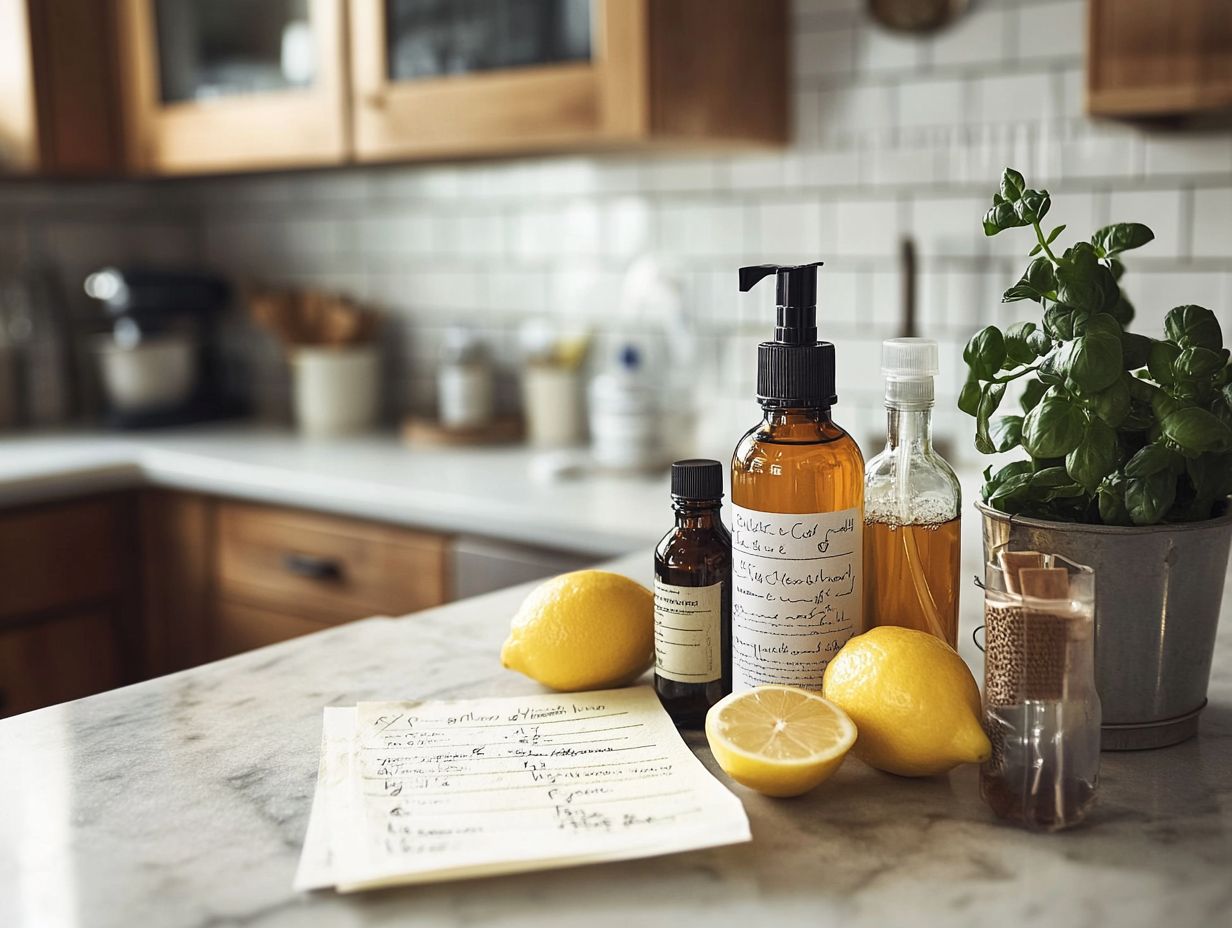
- Homemade floor cleaners are a cost-effective and environmentally-friendly alternative to store-bought cleaners.
- Common household ingredients like white vinegar, baking soda, essential oils, lemon juice, and Castile soap (a gentle soap made from vegetable oils) can be used to make effective homemade floor cleaners.
- Different types of floors require different cleaning methods, and homemade floor cleaners can be customized to suit each type.
Why Use Homemade Floor Cleaners?
Utilizing a homemade floor cleaner not only helps you save money but also gives you the power to take control of the ingredients you’re using, steering clear of harsh chemicals that may raise health concerns.
Many commercial cleaning solutions contain potentially harmful substances that can adversely affect indoor air quality and contribute to environmental issues. By choosing a DIY floor cleaner, you can craft a safe and effective cleaning solution tailored specifically to your flooring types, ensuring that you re employing natural ingredients while maintaining a clean, germ-free, and streak-free home.
What Ingredients Can Be Used to Make Homemade Floor Cleaners?
Crafting your own homemade floor cleaner gives you the power to select ingredients tailored to your unique cleaning requirements, drawing from everyday household items like white vinegar, rubbing alcohol, dish soap, and essential oils.
Each of these components plays a specific role in the cleaning process, guaranteeing that your floors not only shine but also remain free of germs and grime. Moreover, you have the freedom to customize the fragrance and efficiency of your DIY floor cleaner, aligning it perfectly with your preferences while avoiding the potentially harmful chemicals often lurking in commercial products.
1. Vinegar
White vinegar is an incredibly powerful and versatile ingredient that you can incorporate into your homemade floor cleaners. Its natural acidity works wonders, dissolving grime and tackling germs, making it an effective solution for a variety of household surfaces.
Not only is it safe, but its disinfectant properties also ensure that you re reducing bacteria and viruses, helping to maintain a healthy environment in your home. For example, when you mix white vinegar with water, you’ll find it effortlessly tackles those pesky hard water stains on ceramic tile. Using distilled water with white vinegar can further improve the mixture’s ability to remove hard water stains.
For your hardwood floors, a diluted blend of vinegar and water can rejuvenate the wood, leaving it clean and glossy. Just remember to use it sparingly to avoid any potential damage. Laminate floors can benefit from a similar mixture, which helps keep their shine intact without leaving any residue behind. Additionally, a no-rinse formula can be particularly beneficial for laminate floors.
Vinyl floors are also fans of vinegar-based solutions; they cut through grime easily, providing you with a spotless finish. With these simple recipes, you can enjoy a cleaner home while harnessing the natural cleaning power of vinegar. Some cleaning recipes suggest a no-rinse formula to ensure ease of use and efficiency.
2. Baking Soda
Baking soda serves as a gentle abrasive that works wonders in your homemade floor cleaners. It effectively lifts dirt and stains while also functioning as a natural deodorizer, ensuring your home maintains a fresh scent. When combined with a vacuum, it can help in removing deeply embedded dirt.
When mixed with ingredients like white vinegar or lemon juice, this versatile compound significantly boosts your cleaning power. It tackles tough stains across various surfaces. The natural cleaning power of vinegar perfectly complements baking soda, breaking down grime with ease. This makes it particularly effective for tile and linoleum floors.
For those stubborn spots that require a little extra love, you can create a paste with baking soda and water. Apply it directly to the area and let it sit for a few minutes before scrubbing. Regular use will also help neutralize unwanted odors, leaving your hardwood and laminate floors free from lingering smells.
Just remember to test a small area first to ensure compatibility and avoid any damage to your flooring. This is especially important for hard flooring materials like laminate and vinyl. Try these tips today for cleaner, fresher floors!
3. Essential Oils
Essential oils not only infuse your homemade floor cleaner with an inviting fragrance but also bring natural antibacterial and antifungal properties to the table. This significantly boosts the efficacy of your cleaning solution, making them an excellent addition to any cleaning recipe you might be following.
By incorporating oils like tea tree and lavender, you can create a powerful blend that cleans effectively while fostering a calming atmosphere in your home. Tea tree oil, celebrated for its formidable antimicrobial qualities, excels at tackling stubborn grime. Lavender contributes a soothing scent that helps ease stress during your cleaning routine.
When crafting your own solution, consider both the aroma and the specific cleaning properties that each oil offers. Experimenting with various combinations allows you to discover a personalized scent that invigorates your living space and aligns with your cleaning needs. For example, lavender essential oil not only smells great but also helps eliminate germs and grime.
4. Lemon Juice
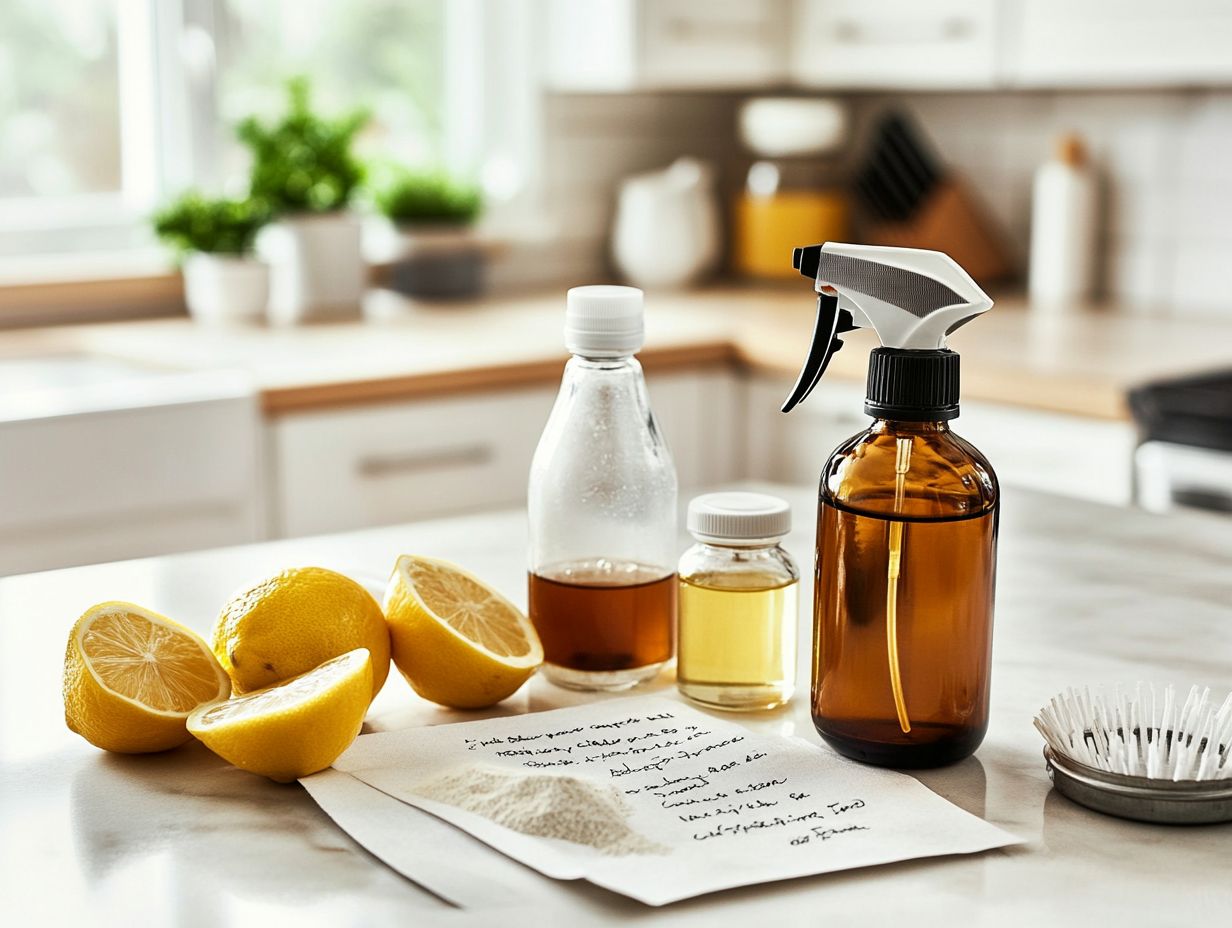
Lemon juice works wonders as a natural disinfectant and stain remover in your homemade floor cleaners, thanks to its citric acid content. It efficiently breaks down grime while leaving behind a refreshing scent.
Its antibacterial properties work wonders in eliminating harmful germs, ensuring your spaces are not only visually appealing but also safer for your family. By incorporating lemon juice into your cleaning solutions, you harness its powerful deodorizing abilities, so your home exudes cleanliness without resorting to artificial fragrances. Lemon juice also helps remove hard water stains from various surfaces.
For a robust cleaning mixture, simply combine one cup of lemon juice with one cup of water and a tablespoon of baking soda. This dynamic blend can tackle tough spots on your floors or counters, effortlessly restoring shine and freshness.
5. Castile Soap: A Versatile Cleaning Ingredient
Castile soap is a biodegradable and versatile cleaning product that you can easily incorporate into your homemade floor cleaners. It offers impressive cleaning power while remaining gentle on both surfaces and the environment.
This plant-based soap isn t just effective at cutting through stubborn grease and grime; it’s safe for many types of floors, from hardwood to vinyl, making it the perfect choice for eco-conscious households.
If you’re keen on creating your own cleaning solutions, you ll appreciate its flexibility. A simple mixture of Castile soap and warm water does wonders on hardwood floors, preserving their shine while ensuring a thorough clean. For ceramic tile, combining Castile soap with vinegar can elevate its cleaning effectiveness.
With these straightforward recipes, you can maintain your floors effortlessly while enjoying the benefits of a sustainable and cost-effective cleaning regimen.
How to Make Homemade Floor Cleaners for Different Types of Floors?
Crafting effective homemade floor cleaners tailored to various flooring types guarantees optimal cleaning results while safeguarding the integrity of your surfaces whether you’re addressing hardwood floors, ceramic tile, laminate, or vinyl.
Each type of flooring demands a precise blend of ingredients designed to tackle dirt, stains, and grime effectively, all while preventing any potential damage.
1. Hardwood Floors
When you re cleaning hardwood floors, it s crucial to use a DIY floor cleaner that strikes the right balance between effectiveness and gentleness to protect that beautiful wood finish and prevent streaks.
To whip up a safe and efficient solution, mix equal parts of white vinegar and water, then add a few drops of mild dish soap to supercharge your cleaning power. White vinegar boasts natural antibacterial properties, making it an excellent choice for tackling dirt and grime without leaving behind harmful residues. The dish soap helps lift those stubborn stains, while the water dilutes the acidity, keeping your wood safe and sound. Using distilled water can further enhance the effectiveness of this cleaning solution.
As you apply this mixture, grab a microfiber mop to avoid soaking your floors. Just dampen the mop enough to pick up dirt without saturating the wood. It s also wise to test the solution in a small, hidden spot before going all in, ensuring your floors retain their luster and integrity. Regular use of a vacuum can also assist in maintaining the cleanliness and longevity of your hardwood floors.
2. Tile Floors: Cleaning Made Easy
For your tile floors, a DIY floor cleaner can work wonders, effortlessly banishing grime and stains while leaving your tiles gleaming and sanitized.
This homemade solution not only elevates the look of your floors but also ensures they are safer for daily use, particularly in high-traffic areas where cleanliness is paramount. To whip up this powerful cleaner, all you need are a few simple yet effective ingredients: white vinegar, baking soda, and essential oils renowned for their antibacterial properties. Adding distilled water can further optimize the solution for ceramic tile and other surfaces.
Begin by mixing one cup of vinegar with one cup of warm water, then add a few drops of your favorite essential oil to infuse a refreshing scent. For those stubborn stains, sprinkle a quarter cup of baking soda directly onto the affected area or mix it into your DIY floor cleaner for an extra boost of scrubbing power.
Apply the mixture with a mop or scrub brush, paying special attention to grout lines for optimal results. For routine cleaning, feel free to use this effective blend weekly or whenever necessary to keep your tile floors in pristine condition.
3. Laminate Floors
Cleaning laminate floors demands a delicate touch, as the wrong cleaning solution can lead to warping or damage. This is why you need a gentle yet effective homemade cleaner in your arsenal.
To craft a safe and efficient cleaner, consider using natural ingredients that won t compromise the integrity of your flooring. Additionally, using a trusted brand like O-Cedar for your cleaning tools can make a significant difference. A simple mixture of warm water, white vinegar, and a few drops of dish soap or detergent works wonders. Start by combining one cup of white vinegar with a gallon of warm water in a bucket. Then, add a small amount of dish detergent to the mix; this will help cut through grease and dirt without leaving any pesky residue behind.
When it comes time to apply your solution, remember to use a damp mop instead of one that s soaking wet. Excess moisture can seep into the seams and cause damage, which is the last thing you want. Gently glide the mop across the floor to ensure a thorough clean while protecting that beautiful surface you ve worked hard to maintain.
4. Vinyl Floors
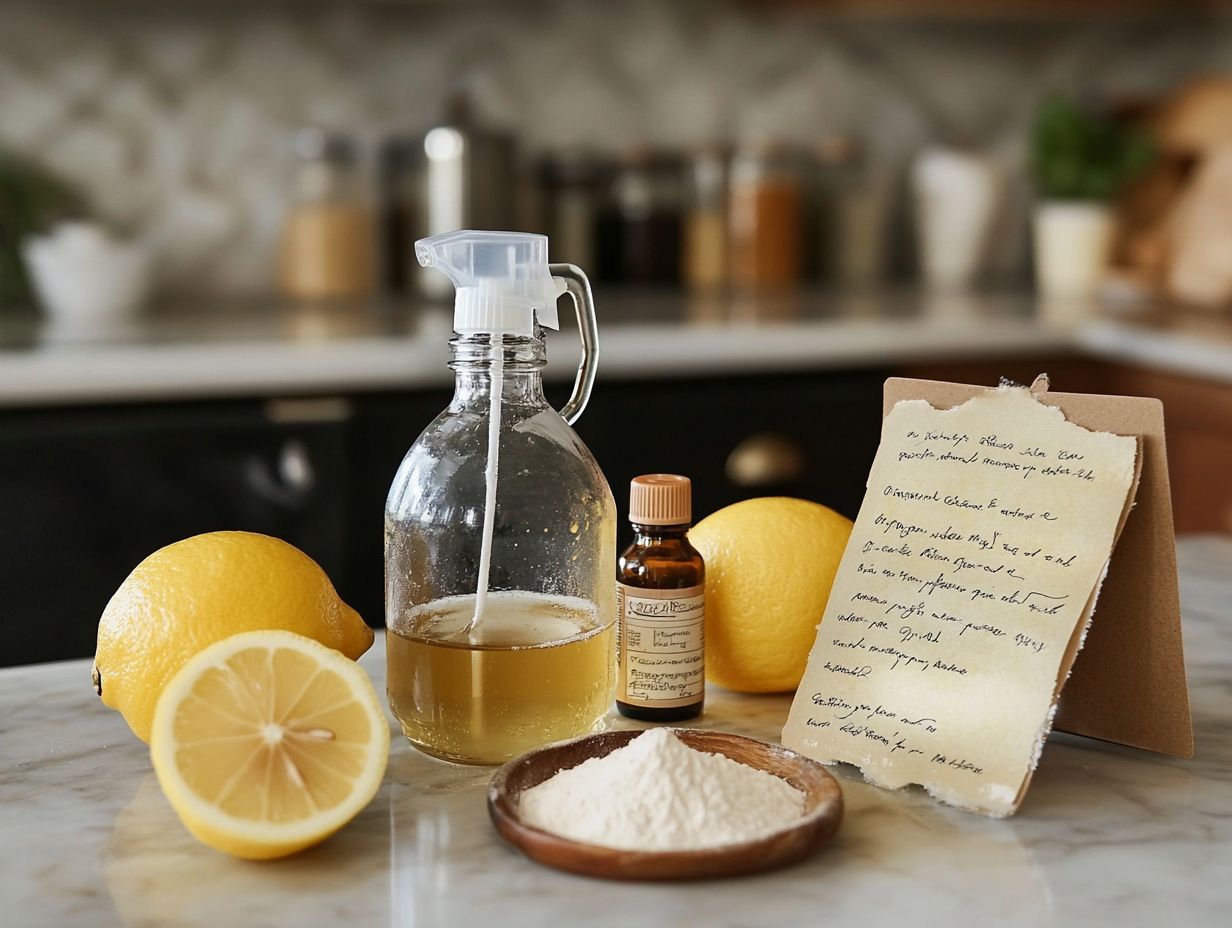
Vinyl floors are known for their durability and ease of cleaning. Using the right homemade floor cleaner is essential to maintain their appearance and prevent damage.
When selecting a cleaning solution, choose safe for the surface ingredients to avoid scratching and to keep those vibrant colors looking fresh. A simple yet powerful recipe involves mixing equal parts of white vinegar and warm water. This combination creates a gentle cleaner. You can enhance the cleaning properties by adding a few drops of dish soap this won t harm the finish and will help tackle tough spots.
For application, opt for a soft mop or cloth instead of a scrubbing brush. Using tools from reliable brands like O-Cedar is crucial for preserving the integrity of your flooring. Regularly cleaning your vinyl floors with this method not only makes them shine but also extends their lifespan.
Enjoy the beauty of your vinyl surfaces for many years to come!
Are Homemade Floor Cleaners Safe to Use?
Homemade floor cleaners are a smart choice when made with natural, non-toxic ingredients. These solutions effectively tackle health concerns often linked to commercial cleaning products that contain harsh chemicals.
Using everyday household items like white vinegar and baking soda, you can create powerful cleaning solutions that also minimize your environmental footprint. This ensures a healthy and safe home for everyone, including your beloved pets. Plus, these DIY floor cleaner recipes can be as effective as commercial options.
What Are the Benefits of Using Homemade Floor Cleaners?
Homemade floor cleaners save you money while letting you pick your ingredients. They also create a smaller environmental footprint compared to commercial cleaning products that frequently harbor harmful chemicals.
By crafting your own cleaning solutions, you can customize them to suit your unique preferences. This results in a healthier living space free from toxic residues. Don t forget to use quality tools from brands like O-Cedar for the best results.
What Are the Potential Risks of Using Homemade Floor Cleaners?
While homemade floor cleaners come with many advantages, it’s important to be aware of the potential risks. You might encounter issues like ineffective cleaning or allergic reactions to specific ingredients.
Not every natural ingredient is suitable for every surface. Improper use could lead to undesirable effects on both your floors and your health. Always test a small area first when trying out a new homemade cleaner.
How to Store Homemade Floor Cleaners?
Proper storage of your homemade floor cleaners is crucial for preserving their effectiveness and ensuring safety. This is especially important when your recipes include ingredients like rubbing alcohol and essential oils.
Storing these cleaners correctly will not only enhance their longevity but also protect your home and loved ones.
How Often Should You Use Homemade Floor Cleaners?
Determining how often to use your homemade floor cleaners depends on several factors. Consider the level of foot traffic, the specific type of flooring, and whether you share your home with pets or children.
A regular cleaning schedule will keep your home looking its best. Establishing a consistent cleaning routine will enhance the appearance and hygiene of your floors, ensuring they remain pristine and inviting.
Frequently Asked Questions
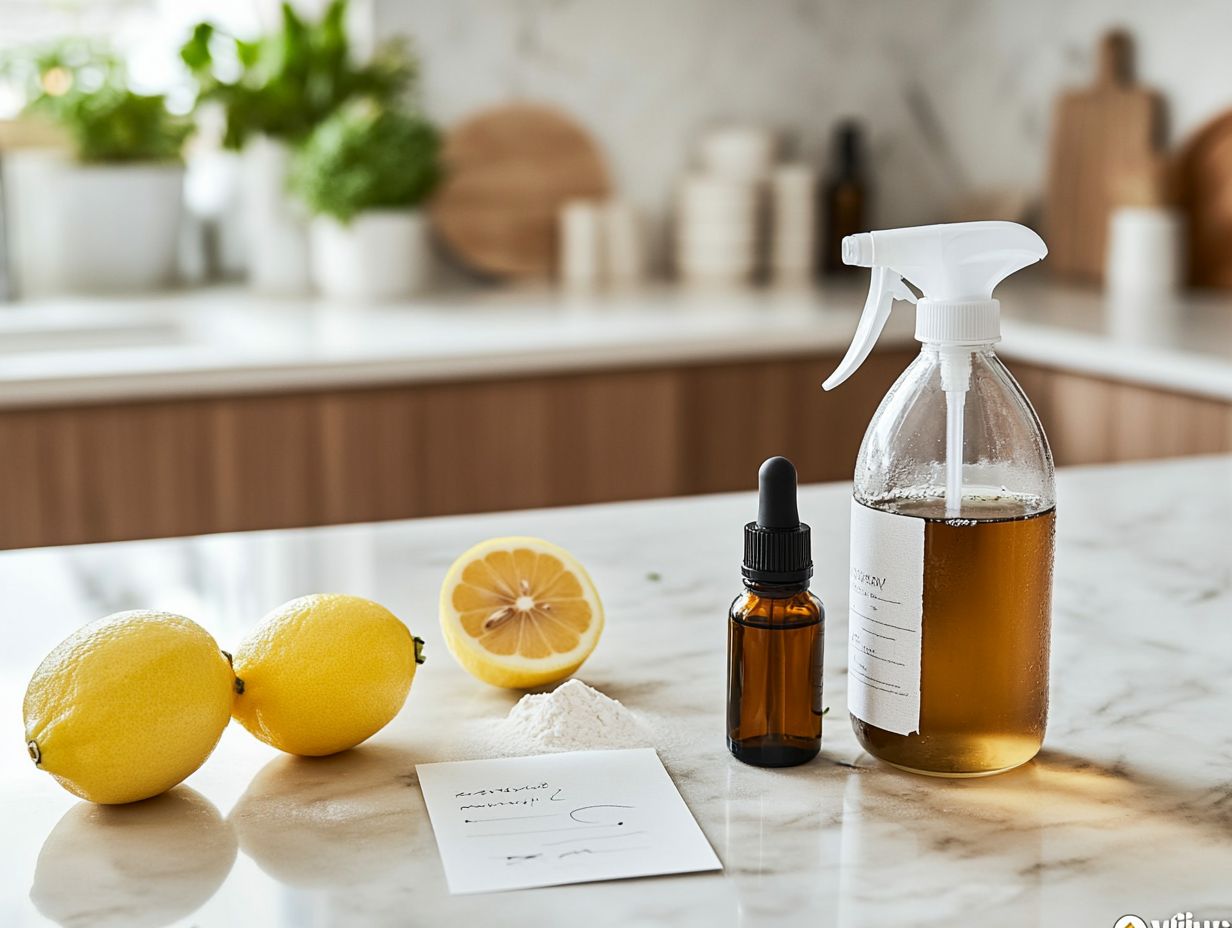
Looking for simple recipes for cleaning your tile floors?
One easy recipe is to mix 1/4 cup of white vinegar, 1 tablespoon of dish soap, and 2 gallons of hot water. Another option combines 1/2 cup of baking soda, 1/4 cup of hydrogen peroxide, and 1 teaspoon of dish soap.
Can I use a homemade cleaner on laminate floors?
Yes, you can use several homemade floor cleaner recipes that are safe for laminate floors. One option is to mix 1 cup of water, 1 cup of white vinegar, and 1/2 cup of rubbing alcohol.
Another recipe combines 1/4 cup of lemon juice, 1/2 cup of white vinegar, and 1/4 cup of olive oil.
Will homemade floor cleaner damage hardwood floors?
No, as long as the ingredients are gentle and non-abrasive (which means they won’t scratch the surface), homemade floor cleaner should not damage hardwood floors.
Avoid using harsh chemicals or acidic ingredients like lemon juice or vinegar, as these can strip the finish on hardwood floors.
Can I add essential oils to my homemade floor cleaner?
You can add essential oils to homemade floor cleaner for a pleasant scent and extra cleaning properties. Popular choices include lemon, tea tree, and lavender.
Start with a few drops and adjust the amount based on your preference.
What is the best homemade floor cleaner for pet owners?
A great DIY floor cleaner for pet owners is a mixture of 1 cup of water, 1 cup of apple cider vinegar, and 1 tablespoon of dish soap.
This combination is safe for pets and helps eliminate lingering odors on floors.
Are there any homemade floor cleaner recipes for vinyl floors?
Yes, a simple homemade floor cleaner for vinyl floors can be made by mixing 1 cup of water, 1/4 cup of white vinegar, and 1 tablespoon of dish soap.
Another option combines 1/4 cup of rubbing alcohol, 1/4 cup of white vinegar, and 2 cups of warm water.
Ready to clean your floors naturally? Grab these simple ingredients and let s get started!

